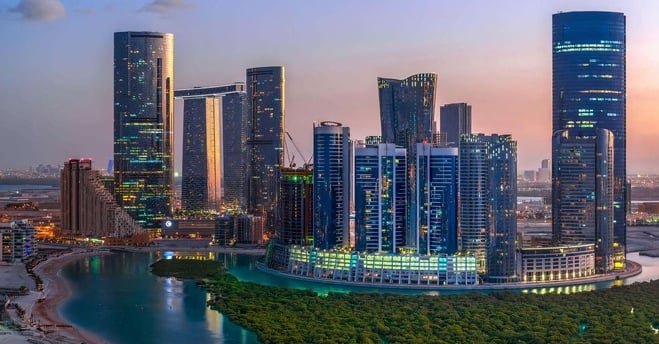Real Estate Investment in Abu Dhabi: Opportunities and Growth in 2025
Explore the evolving real estate market in Abu Dhabi. This article covers key investment zones, rental yields, regulatory benefits, and the future outlook for investors in 2025.


Real Estate Investment in Abu Dhabi: A Strategic 2025 Outlook
Introduction
As global markets face increasing volatility, investors are turning toward more stable and asset-backed opportunities. Real estate, particularly in economically strong regions, remains a top choice. Among the GCC countries, Abu Dhabi has solidified its position as a key investment destination in 2025. Thanks to its political stability, investor-friendly regulations, and ambitious urban development plans, the emirate is witnessing a surge in real estate activity across all segments.
Market Dynamics
Abu Dhabi’s real estate sector is experiencing a strong upward trajectory in both demand and value. Residential units, especially in prime areas like Saadiyat Island, Yas Island, and Al Reem Island, are witnessing double-digit annual price appreciation. Rents have also increased significantly, driven by population growth, a return of expatriates, and expanding business sectors such as technology, tourism, and clean energy.
Luxury villas and high-end waterfront apartments are particularly in demand, with many projects offering private beaches, branded residences, and resort-style amenities. This segment caters to both wealthy residents and international investors seeking long-term returns and lifestyle benefits.
Meanwhile, the affordable and mid-market housing sectors continue to see steady uptake. Developers are responding by launching community-focused developments that offer schools, parks, retail, and healthcare facilities within integrated masterplans.
Why Abu Dhabi?
Several strategic factors make Abu Dhabi an appealing destination for real estate investors:
High Rental Yields: Properties in selected zones are generating net rental returns between 6% and 9% annually, significantly outperforming global benchmarks in cities like London or New York.
Zero Property Tax: Investors enjoy full ownership rights in designated areas without the burden of annual property taxes or capital gains tax.
Political and Economic Stability: The leadership’s long-term vision, economic diversification efforts, and robust infrastructure investment provide a secure environment for capital preservation and growth.
Strong Regulatory Framework: The emirate has streamlined property registration, enhanced transparency in transactions, and is constantly improving investor protection.
Lifestyle and Infrastructure: World-class healthcare, education, entertainment, and transport systems enhance livability, which in turn drives housing demand and price stability.
Key Investment Zones
Yas Island: A prime location for luxury waterfront homes, popular among families and holiday-home investors.
Saadiyat Island: A cultural and high-end residential hub with ongoing premium developments.
Al Reem Island: A balanced investment area, offering both high-rise urban living and strong rental demand.
Masdar City: A future-forward district focused on sustainability and clean energy, gaining attention from eco-conscious investors.
Al Shamkha and Khalifa City: Growing suburban areas appealing to mid-income investors looking for long-term capital appreciation.
Emerging Trends
Several new trends are shaping Abu Dhabi's property investment scene in 2025:
Branded Residences: Developments in partnership with luxury brands (e.g., fashion, automotive, and hospitality) are increasing, offering investors strong resale value and prestige.
Flexible Payment Plans: Developers are offering long-term post-handover payment options, reducing entry barriers for first-time buyers and investors.
Smart Home Integration: Properties are increasingly equipped with advanced automation and energy-efficient technologies, aligning with global sustainability goals.
Short-Term Rental Investments: Due to rising tourism, many investors are turning to serviced apartments and short-stay rental models for higher monthly income.
Risks and Considerations
Like any investment, real estate in Abu Dhabi comes with its own set of risks. These include:
Project Delays: Some off-plan developments may face timeline setbacks.
Liquidity Constraints: Unlike stocks or crypto assets, real estate is less liquid and requires longer exit timelines.
Tenant Risk: For rental properties, vacancy periods or non-paying tenants can impact ROI.
However, with proper due diligence, strategic location selection, and professional property management, these risks can be mitigated.
Conclusion
Abu Dhabi’s real estate market in 2025 is not just growing — it is maturing. Investors benefit from a rare combination of high returns, low taxation, and macroeconomic stability. As the emirate continues to diversify its economy and expand its infrastructure, the real estate sector stands as a powerful vehicle for wealth creation and preservation. Whether you're a seasoned investor or exploring property ownership for the first time, Abu Dhabi presents a fertile ground for smart, long-term investment.
At “Forsah Real Estate,” We believe every real estate investment is a step toward achieving dreams. We prioritize exceptional customer service, built on transparency and trust, aiming to forge lasting relationships by exceeding client expectations.
ADM:202401587731 - CN:3727493
Contact
+971 50 227 4727
© Copyright 2025 by Forseh Real Estate

